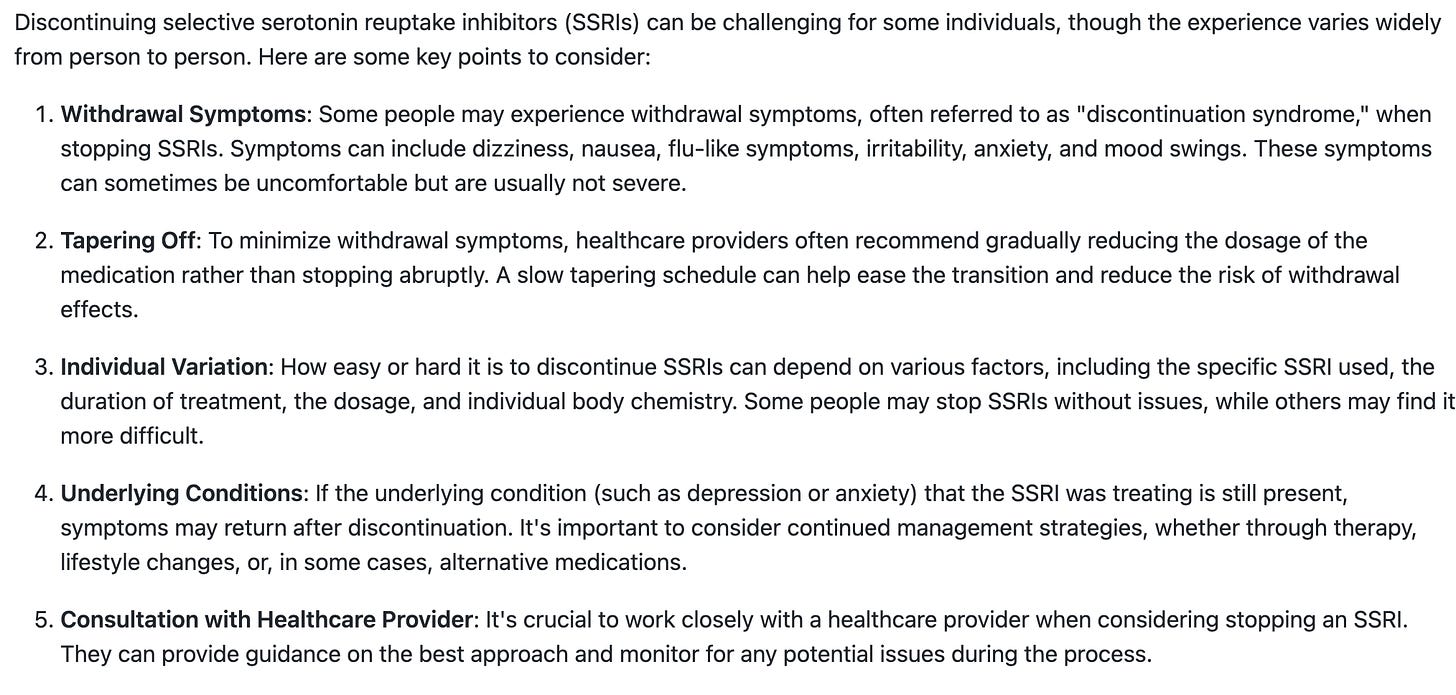The False Polarization of SSRIs
What does a yes/and approach to mental health medication look like?
Dear Voyagers,
If you’ve been reading my work for a while, you likely already know my general stance on this topic: SSRIs provide crucial support when needed, like crutches for your brain.1 Since many people face strong headwinds on their medication journeys,2 I strongly believe in demystifying SSRIs. I applaud people who share their SSRI experiences with an open heart as writer/director Mark Duplass did on Instagram a couple of weeks ago:
Thank you Mark and good job! These things are true. These things are important. Or, to use Voyager language, these things light the path for others.
But.3
When faced with challenging complexity, the human mind hungers for simplicity like John Wick hungers for revenge. It will stop at nothing to find that sweet, sweet clarity, including overlooking pesky details that complicate the picture.
In the realm of SSRIs, this desire for simplicity leads us down a path of false dichotomy by pitting a “pro” SSRI camp (often people who have witnessed their effectiveness first-hand) against an “anti” one (people who question that effectiveness or witness the difficulty of transitioning on and off them). The result of this black-and-white thinking is the kind of problematic rhetoric Mark is referencing at the beginning of his post. When the general public isn’t able to make sense of SSRI complexity because doctors or the news media haven’t figured out how to,4 they get angry and loud and use overblown metaphors. They liken getting off SSRIs to getting off of heroin. It’s an emotional response, one born of frustration.
Understanding the frustration
Imagine this: You’ve finally accepted you need help and you’ve decided to give SSRIs a try. You’re lucky enough5 to have a trusted care provider — a psychiatrist, psychopharmacologist, or even medical doctor — so you set up an appointment to discuss options. Once there, you’re given a couple of medication choices. You ask about side effects and get a list of them. You take your first pill and hope for the best.
Over the next few months, you return to that side effect list, as well as Reddit, as you learn from experience how that SSRI interacts with your specific brain chemistry. You start to feel better as you started to accept that the medication journey is unpredictable and ever-changing. This is not something anyone prepared you for. It’s not how medicine tends to be discussed in our culture.
You don’t want to add to stigma so you speak very carefully about the medication you’re on, waving away your misgivings while telling people that you’re improving. Your friends and family want you to be well so they are happy to hear the drugs are helping you. You leave it at that. Yay medication!
At some point you decide you’re strong enough to once again try life without SSRIs. Your feelings are complex: You’re grateful that the medication existed to support you (“pro” camp) and you’re ready to experience life without its side effects or other challenges (“anti”camp). Research has shown that a lack of clear titration guidelines and inconsistent messaging from doctors makes getting off SSRIs a particularly difficult stage of the medication journey.6 As you tunnel into online forums trying to piece together the right steps to take, your faith in the medical system is shaken. Is it not exactly the science you thought it was? You eventually come off the drug and the side effects pass. You hold contradictory ideas in your head about the meds, but you don’t tend to speak them aloud since what is the point? The whole thing is confusing anyway.
A path paved with yes/and statements
When it comes to thorny or complex topics like SSRI usage, one way to soothe the clarity-seeking mind is to create a series of yes/and statements:
SSRIs can be incredibly helpful and very difficult to get on and off of.
The medical establishment is still early in its understanding of how these drugs work and SSRIs are anecdotally shown to help people in important ways.
There is mixed data about the long term effectiveness of SSRIs in treating depression and anxiety and when you are out of other options, SSRIs can feel like a miracle.
I find that yes/and statements work especially well when focused: “Lexapro was an incredible support when I needed it and it was hard to find the right information about the best way to get off of it.”
Let’s see what ChatGPT says about tapering off of SSRIs:
This response feels like it is calm and clear in a way that media descriptions tend not to be.7 Indeed, I’d assert that the false polarization of SSRI usage into “pro” and “anti” camps tends to be the result of easy media narratives, and those stories are created in the absence of wider alignment and institutional agreement. Might AI change that in the future? Could AI lead more people to a deeper understanding of the yes/and nature of mental health medication? That story is still unfolding, but I’m here to find out.
If you’ve taken or take SSRIs, I’d love to hear about how you frame their complexity to yourself and others. When does John Wick come out in your own feelings about the journey? Share in the comments below.
Since crutches are usually short-term and SSRIs can be long or short term, a better analogy might be shoe inserts or a back brace, but who I am to quibble with myself of one year ago?
Mental health stigma and cultural expectations of self-sufficiency; a lack of clear communication around how much experimentation will be involved due to unique brains; the challenges of onboarding and confusing information about side effects.
What? A but? How could there possibly be a but?
This USA Today piece on SSRIs, for example, reads: "Withdrawal symptoms usually start within 5 days of stopping the medicine and last 1 to 2 weeks, and are typically mild, according to the NHS and American Academy of Family Physicians. However, some people have severe withdrawal symptoms that last for several months or more. One study showed that these symptoms can last up to one year, but according to the Cleveland Clinic, another study showed that 2% of people who experienced discontinuation symptoms had lasting symptoms for three or more years." Seems like a thoughtful framing, but misses one essential element. Anyone who been on these meds know that titration is a crucial part of the withdrawal debate, is often overlooked by doctors, and is never mentioned in articles like this.
Don’t get me started on what it takes to find that person, often its own hero’s journey of epic proportions.
“All participants experienced negative physical withdrawal symptoms at some stage. Participants frequently self-managed their withdrawal due to limited GP involvement and reported insufficient resources or evidence-based guidance.”
Not always! Check out this story, “Are Antidepressants Addictive?” from CNN. Where most stories on Robert Kennedy Jr’s comments are simplistically condemning, this piece includes important framing from Dr. Josef Witt-Doerring, founder of a private practice called TaperClinic that specializes in helping people transition off of SSRIs. He says, “What [Kennedy] said is true, but I think the context of it is important too…” He goes on to explain that for the many people who are vulnerable to withdrawal, Kennedy is pointing at something real.







